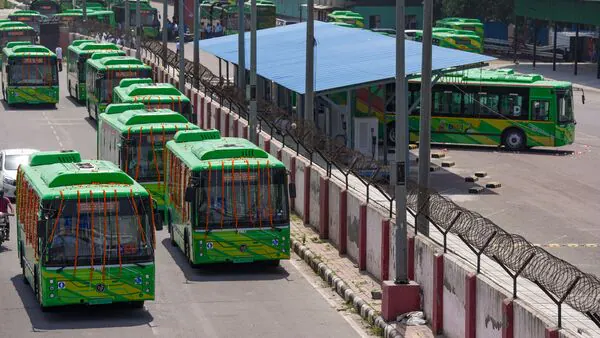
Only 12 States, Uts Bat For Payment Security To Boost E-Bus Operations
New Delhi: Only 12 states and Union territories-Gujarat, Karnataka, Rajasthan, Punjab, Telangana, Andhra Pradesh, Madhya Pradesh, Meghalaya, Maharashtra, Uttarakhand, Odisha and Jammu & Kashmir-out of 36 have deposited the payment security mandate with the Reserve Bank of India (RBI) under the Union government's PM E-bus Sewa payment security mechanism (PSM), according to two people aware of the development.
The PM E-bus Sewa PSM scheme plans to build confidence in e-bus makers and operators to deploy more than 38,000 zero-emission buses on the roads.
“Maharashtra has submitted its DDM in August, followed by Odisha and Jammu and Kashmir in September. Now, there are 12 states and UTs which have submitted the DDM under the PM E-bus Sewa PSM," said an official aware of the development.
Also Read | Great e-bus shake-up: Why Tata Motors is losing groDDM refers to a direct debit mandate, which confirms the state or UT's participation in the payment security mechanis.
Mint reported on 7 October that the government had received Maharashtra's DDM, allowing e-buses to be tendered in Mumbai and Pune under the PM E-Drive scheme.
The payment security mechanism was created by the government almost a year ago, after multiple state transport agencies that procured e-buses were unable to pay their dues to the manufacturers and operators.
This mechanism creates a deposit akin to a bank guarantee, which can be paid to OEMs and operators in the event of a procuring agency's default on timely payments.
Also Read | India's e-bus market rebounds: Why Delhi is outpacing Maharashtra, Tamil NIn the event of payment defaults, the government will utilise the fund created under the PSM scheme to compensate bus makers and operators, which will be recouped from PTAs and STAs later.
Interestingly, Delhi, which has bought the most e-buses, has not yet deposited a PSM.
E-bus tenders are most commonly awarded under the gross cost contract (GCC) model. This model places public transportation agencies (PTAs) or state transportation agencies (STAs) as procurers and they must pay a per-kilometre cost to bus manufacturers and operators.
Mint sought comments from all 12 states that have submitted the direct debit mandate under the PSM on 16 October, but none have been received.
Email queries sent to all other states and Union territories, seeking reasons why they had not deposited the direct debit mandate under the scheme as of the specified date, were also unanswered.
Also Read | Eka Mobility to invest ₹800 crore to ramp up e-bus productQueries to the Union heavy industries ministry and RBI also remained unanswered.
Electrification pushThe PM E-bus Sewa PSM is a part of the concerted government effort to boost e-bus adoption. Chief economic advisor V. Anantha Nageswaran said in the economic survey of fiscal year 2025 (FY25) that electrifying public transportation is key to reducing vehicular emissions and oil import dependence.
This scheme operates in tandem with the ₹10,900-crore PM E-Drive scheme, which aims to reduce the upfront costs of procuring 14,028 e-buses for procurers, with an allocation of ₹4,391 crore.
The PSM scheme, operated by the heavy industries ministry, has an outlay of about ₹3,435 crore, which will be used to set up a fund for disbursing dues to bus makers and operators, in case of delays from PTAs and STAs.
Domain experts said quicker e-bus adoption in the country will lead to faster decarbonisation of Indian roads, provided intercity buses can operate with chargers on highways and expressways.
The government is also ramping up charger capacity under the PM E-Drive scheme, with a plan to cover a majority of the cost of installing over 72,000 chargers in public places, including highways.
This comes as Indian e-bus sales are gradually rising. In H1 FY26 (April-September), e-bus sales in the country rose 37% from the same period last fiscal.
A study conducted by NITI Aayog, in collaboration with the think tank WRI, in August, ranked states based on overall advancements in the EV sector, with Delhi, Maharashtra, and Chandigarh emerging as frontrunners. The same three states also led the way in pushing policy to boost electric vehicle (EV) adoption, according to the India Electric Mobility Index (IEMI) for 2024.
Key Takeaways-
Only 12 out of 36 states and UTs have completed the payment security mandate required for the Union government's PM E-bus Sewa Payment Security Mechanism (PSM).
The PSM acts as a 'bank guarantee' deposit to ensure e-bus manufacturers and operators are paid on time, preventing defaults by state transport agencies.
The mechanism is crucial for building industry confidence, which is needed to achieve the government's target of deploying over 38,000 zero-emission buses.
The PSM is part of a concerted national effort to boost e-bus adoption and decarbonize public transport, running alongside the ₹10,900-crore PM E-Drive scheme, which subsidizes bus costs and charger installation.
Legal Disclaimer:
MENAFN provides the
information “as is” without warranty of any kind. We do not accept
any responsibility or liability for the accuracy, content, images,
videos, licenses, completeness, legality, or reliability of the information
contained in this article. If you have any complaints or copyright
issues related to this article, kindly contact the provider above.
Most popular stories
Market Research
- Thinkmarkets Adds Synthetic Indices To Its Product Offering
- Ethereum Startup Agoralend Opens Fresh Fundraise After Oversubscribed $300,000 Round.
- KOR Closes Series B Funding To Accelerate Global Growth
- Wise Wolves Corporation Launches Unified Brand To Power The Next Era Of Cross-Border Finance
- Lombard And Story Partner To Revolutionize Creator Economy Via Bitcoin-Backed Infrastructure
- FBS AI Assistant Helps Traders Skip Market Noise And Focus On Strategy




















Comments
No comment